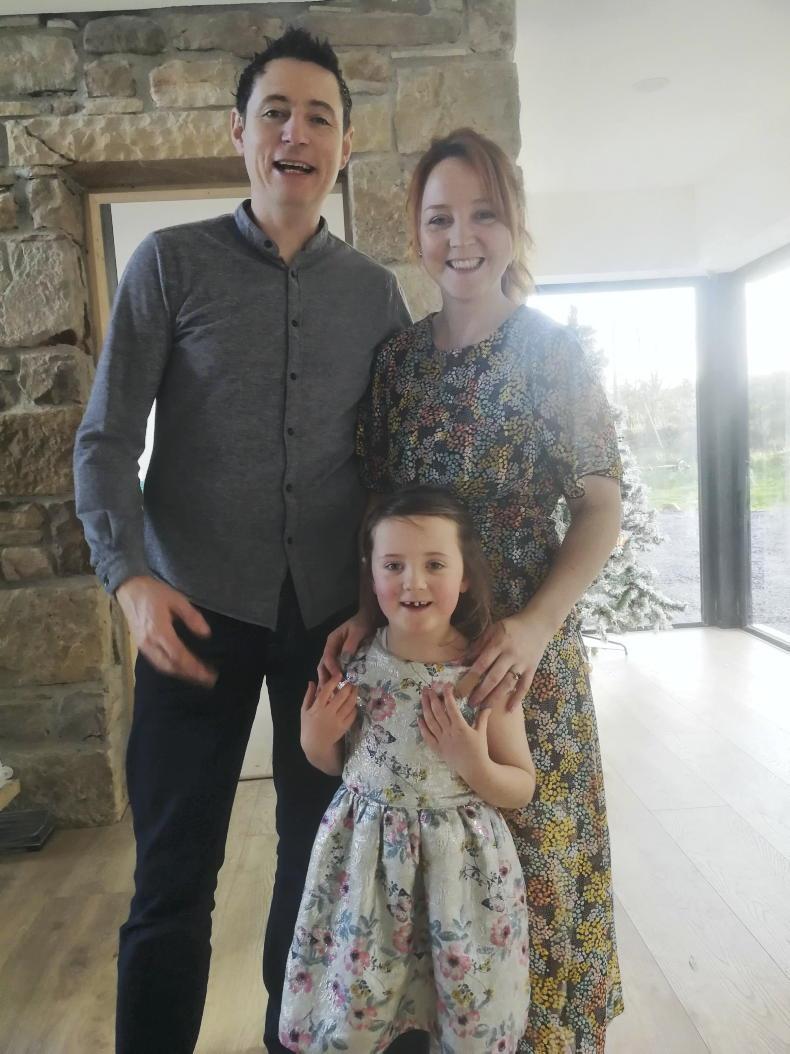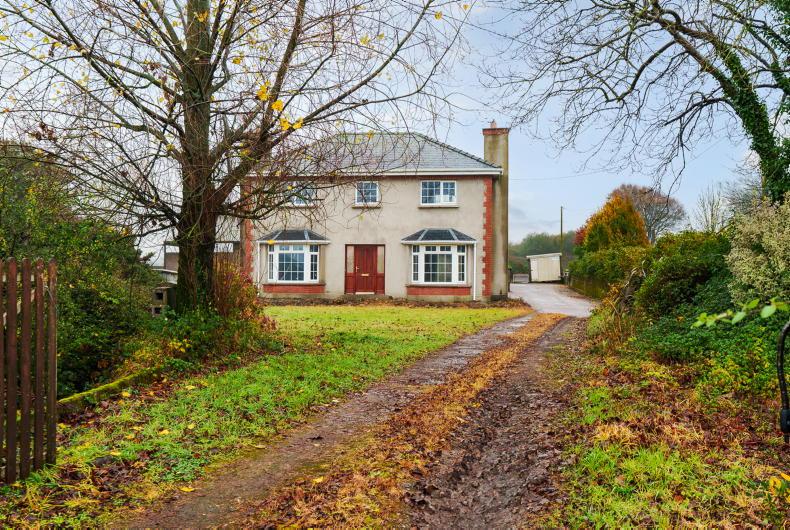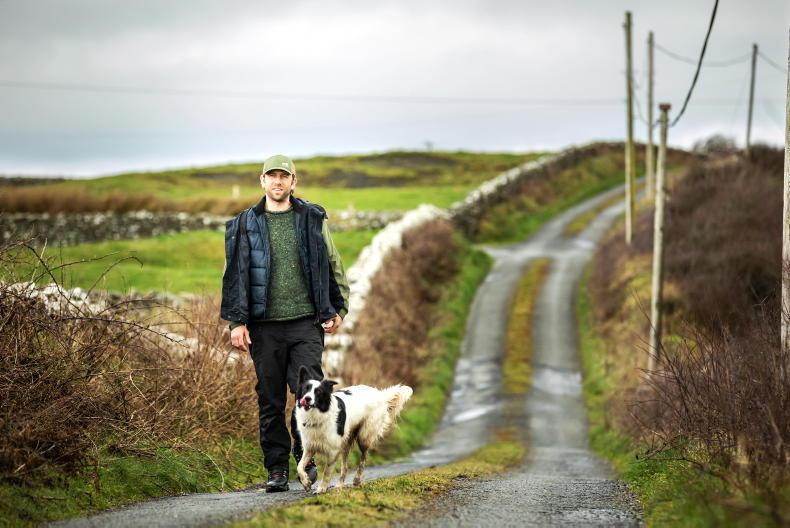Declan Sweeney and his wife Nessa were both born and bred in Co Leitrim. Like many Irish people, they lived abroad for a time.
Again, like many Irish people, after a number of years they got the grá for home.
An occupational therapist, Nessa was on a HSE panel when she was offered a full-time position.
Having been in London for the best part of 10 years, with their then-six-month-old son, in 2013 they upped sticks and moved home.
When they first returned, the family lived in Tullaghan, Co Leitrim. Declan was doing some teaching work in Sligo and in 2016 he had co-set up his own business, Campus Connect. It connects college students virtually before they start third level with others on their prospective course.
By 2016 also, baby number two had arrived and the family were looking for a house of their own. Declan is from a small beef farm three miles outside Kiltyclogher, which he’s involved in with his father.

Declan Sweeney and his wife Nessa with their daughter.
“I’d be fairly active in helping Dad out," Declan says. "He was hoping to hand over the reins. He was diagnosed with MS (multiple sclerosis) as well, so that put a bit more pressure as to how are we going to deal with all this?”
Planning journey begins
The couple thought about building initially, but knowing how challenging it can be to secure planning in the area, they looked to see if there was anything on the market nearby. With nothing suitable, they decided to build.
“There was a site on the farm and there was an old building on it, a ruin. The biggest issue in Leitrim is the septic tank. It was kind of a good piece of ground. In Leitrim there aren’t that many good pieces of ground, because it’s wetland, it’s boggy and so on.
“The rules from the outset mean that in Leitrim you are very limited as to even where you can potentially build, but we thought, there’s a chance here. We got an engineering company out and they did an initial test hole to see whether it would pass, and it would. There was an old site on it and there was an existing lane up to it; so you’re thinking, we’re ticking a lot of boxes here.”
The application was submitted to Leitrim County Council. It was refused on the basis that there wasn’t a 150m sight line either side coming onto the public road.

Declan Sweeney and the kids taking a break as their house was being built.
“We had 150m on the Rossinver side and we had about 110/120m on the Kilty side, so we were very close, but no cigar. Now this is a rural road where there is one car every hour,” Declan explains.
“When I told people there was a checklist of all the things you need to have and that we failed to get planning on the Kilty to Rossinver road because we were creating a traffic hazard, everybody laughed. That was how farcical it was. On these tiny, little rural roads, really to get 300m of straight road is impossible. There isn’t 300m of straight road anywhere on the road.
“If you couple that with the septic tank, you are creating a bar that no one can reach. We were so close, we were only 30m from it, which was driving me mad, but we were determined. So we went back again and said, ‘OK, let’s talk to them and see what we can do. Surely there’s a way.’”
They were told if they removed the hedgerow across the road, with the land owner’s permission, the sight lines would be suitable. They did this. They also did a traffic speed test on the road to check how often and at what speed cars were driving. Then they resubmitted their application.
Low point
“The council were satisfied at that stage that we had sufficient sight lines, but at the final hurdle they wanted me to remove poles,” Declan says. “There were two poles at the other side of the road blocking the sight line and they asked me if I could have the two poles removed.
“At this stage you realised, hold on a minute, the goal posts are moving. This is what we were required to do and now we have to do something different. That was probably the lowest point of the whole thing, because we thought, there was a concerted effort here to try and put us off.”
At this stage Declan was frustrated with conflicting messages on the policies around employment and housing in the area.
“On the one hand I was on a start-up programme in Sligo, there was this talk of bringing people back to the communities and creating jobs. We were doing that, we had started this business, we were employing people, but yet there was no place for us to live.
“What two different Government organisations were saying were at odds. The health of places like Manorhamilton is built on a strong rural hinterland. The land where the house was being built was provisionally approved for forestry. Surely a forestry lorry coming out of an entrance is more of an issue than a family vehicle?”
At this stage baby number three had arrived and they were renting an old bungalow near Declan’s home house.
In spite of obstacles, Declan and Nessa kept going. They contacted the company that looked after the poles on behalf of Eir. The company quoted them €5,000 to move the poles. They agreed and Declan spent a weekend doing some of the ground work himself to reduce the cost.
In the end though, the head engineer from the company came out and informed them that the poles could not be removed as there was fibre broadband cables attached.
“He expressed concern over why the council were requiring someone who was building a one-off domestic house to actually move public real estate, to move poles. The lengths we were being asked to do were just extraordinary. He couldn’t understand it. He said, ‘Why would an individual at this level be required to do something like that?’
“So I asked him to put something like that in writing. He wrote a letter saying that he felt it was unreasonable. Seán McDermott a local councillor was working with me on it at the time and he brought that to the local planning authority. They contested it and there were debates and so on. Eventually, we got planning after all that.”
That was in 2019, two years after the process had begun.
Closing the door on rural Ireland
Declan says theirs was the first house built in the area since the early 90s and there has been no other house erected in the area in the time since.
On reflection, although they are delighted to be raising their now four children on the farm, Declan says he couldn’t recommend the process to others in a similar position.
“It was an extraordinary effort. I always think could I recommend that to people from Manorhamilton who are living in the UK looking to come back here and build a house? To go through that, you couldn’t ask anybody to do that.
“I don’t understand what the approach is, what’s the long-term vision [for housing and planning]? Maybe they just don’t want one-off housing in the countryside.
“I don’t think anyone would disagree with that and I know lots of people have had a similar experience. Some people have given up. I know a guy who lives in Rossinver and he gave up after spending in excess of €15,000 or €20,000 on planning. He wanted to build on his family farm.”
In the context of rural Ireland, Declan feels complex planning procedures deter many people.
“I think when you’re living in London and all these places, people dream about building a house at home, because the quality of life is tremendous here. The level of uncertainty and the challenges are just phenomenal. I think it’s a massive issue, it’s a huge obstacle. It definitely closes the door on rural Ireland and Leitrim for so many people.”
“It’s stressful for us and very stressful for everyone around us. Family, neighbours, everyone was trying to get us to continue, asking and hoping. People were angry, neighbours were angry.
“My brother is in Dublin and he’s also now looking at options, while it was difficult for us, it’s even more challenging for him. He’s someone who would potentially come back to an area and settle, but at the moment that option isn’t there. With nowhere to buy and no option for building, I don’t know what the solution is.”
Resilience
Declan is very clear as to why they’re sharing their story - they want to do what they can to help bring about change and make it easier for others to settle in Leitrim. While he acknowledges their situation was tough, they feel like the lucky ones having been able to settle at home.
In spite of challenges, Declan says locals are resilient. Kiltyclogher is of course the village that spearheaded the Kilty Life campaign, which attracted families from the city to the area in order to save the local primary school.
“Locals are definitely a resilient bunch. The Kilty Life campaign was an example of that, the school was really on its knees, but they fought tooth and nail to get people into the area to keep it going.
“With COVID and working from home, alongside the right internet and services, you can have that independence now of where you can live and then enjoy the quality of life that we have. It just needs to be shared at Government level, because at the moment it seems to be at odds with what the policies are and the types of constraints that there are.
“It’s a test that no one can pass.”
Read more
House in the Country: one-off rural housing
House in the Country: rising prices
Declan Sweeney and his wife Nessa were both born and bred in Co Leitrim. Like many Irish people, they lived abroad for a time.
Again, like many Irish people, after a number of years they got the grá for home.
An occupational therapist, Nessa was on a HSE panel when she was offered a full-time position.
Having been in London for the best part of 10 years, with their then-six-month-old son, in 2013 they upped sticks and moved home.
When they first returned, the family lived in Tullaghan, Co Leitrim. Declan was doing some teaching work in Sligo and in 2016 he had co-set up his own business, Campus Connect. It connects college students virtually before they start third level with others on their prospective course.
By 2016 also, baby number two had arrived and the family were looking for a house of their own. Declan is from a small beef farm three miles outside Kiltyclogher, which he’s involved in with his father.

Declan Sweeney and his wife Nessa with their daughter.
“I’d be fairly active in helping Dad out," Declan says. "He was hoping to hand over the reins. He was diagnosed with MS (multiple sclerosis) as well, so that put a bit more pressure as to how are we going to deal with all this?”
Planning journey begins
The couple thought about building initially, but knowing how challenging it can be to secure planning in the area, they looked to see if there was anything on the market nearby. With nothing suitable, they decided to build.
“There was a site on the farm and there was an old building on it, a ruin. The biggest issue in Leitrim is the septic tank. It was kind of a good piece of ground. In Leitrim there aren’t that many good pieces of ground, because it’s wetland, it’s boggy and so on.
“The rules from the outset mean that in Leitrim you are very limited as to even where you can potentially build, but we thought, there’s a chance here. We got an engineering company out and they did an initial test hole to see whether it would pass, and it would. There was an old site on it and there was an existing lane up to it; so you’re thinking, we’re ticking a lot of boxes here.”
The application was submitted to Leitrim County Council. It was refused on the basis that there wasn’t a 150m sight line either side coming onto the public road.

Declan Sweeney and the kids taking a break as their house was being built.
“We had 150m on the Rossinver side and we had about 110/120m on the Kilty side, so we were very close, but no cigar. Now this is a rural road where there is one car every hour,” Declan explains.
“When I told people there was a checklist of all the things you need to have and that we failed to get planning on the Kilty to Rossinver road because we were creating a traffic hazard, everybody laughed. That was how farcical it was. On these tiny, little rural roads, really to get 300m of straight road is impossible. There isn’t 300m of straight road anywhere on the road.
“If you couple that with the septic tank, you are creating a bar that no one can reach. We were so close, we were only 30m from it, which was driving me mad, but we were determined. So we went back again and said, ‘OK, let’s talk to them and see what we can do. Surely there’s a way.’”
They were told if they removed the hedgerow across the road, with the land owner’s permission, the sight lines would be suitable. They did this. They also did a traffic speed test on the road to check how often and at what speed cars were driving. Then they resubmitted their application.
Low point
“The council were satisfied at that stage that we had sufficient sight lines, but at the final hurdle they wanted me to remove poles,” Declan says. “There were two poles at the other side of the road blocking the sight line and they asked me if I could have the two poles removed.
“At this stage you realised, hold on a minute, the goal posts are moving. This is what we were required to do and now we have to do something different. That was probably the lowest point of the whole thing, because we thought, there was a concerted effort here to try and put us off.”
At this stage Declan was frustrated with conflicting messages on the policies around employment and housing in the area.
“On the one hand I was on a start-up programme in Sligo, there was this talk of bringing people back to the communities and creating jobs. We were doing that, we had started this business, we were employing people, but yet there was no place for us to live.
“What two different Government organisations were saying were at odds. The health of places like Manorhamilton is built on a strong rural hinterland. The land where the house was being built was provisionally approved for forestry. Surely a forestry lorry coming out of an entrance is more of an issue than a family vehicle?”
At this stage baby number three had arrived and they were renting an old bungalow near Declan’s home house.
In spite of obstacles, Declan and Nessa kept going. They contacted the company that looked after the poles on behalf of Eir. The company quoted them €5,000 to move the poles. They agreed and Declan spent a weekend doing some of the ground work himself to reduce the cost.
In the end though, the head engineer from the company came out and informed them that the poles could not be removed as there was fibre broadband cables attached.
“He expressed concern over why the council were requiring someone who was building a one-off domestic house to actually move public real estate, to move poles. The lengths we were being asked to do were just extraordinary. He couldn’t understand it. He said, ‘Why would an individual at this level be required to do something like that?’
“So I asked him to put something like that in writing. He wrote a letter saying that he felt it was unreasonable. Seán McDermott a local councillor was working with me on it at the time and he brought that to the local planning authority. They contested it and there were debates and so on. Eventually, we got planning after all that.”
That was in 2019, two years after the process had begun.
Closing the door on rural Ireland
Declan says theirs was the first house built in the area since the early 90s and there has been no other house erected in the area in the time since.
On reflection, although they are delighted to be raising their now four children on the farm, Declan says he couldn’t recommend the process to others in a similar position.
“It was an extraordinary effort. I always think could I recommend that to people from Manorhamilton who are living in the UK looking to come back here and build a house? To go through that, you couldn’t ask anybody to do that.
“I don’t understand what the approach is, what’s the long-term vision [for housing and planning]? Maybe they just don’t want one-off housing in the countryside.
“I don’t think anyone would disagree with that and I know lots of people have had a similar experience. Some people have given up. I know a guy who lives in Rossinver and he gave up after spending in excess of €15,000 or €20,000 on planning. He wanted to build on his family farm.”
In the context of rural Ireland, Declan feels complex planning procedures deter many people.
“I think when you’re living in London and all these places, people dream about building a house at home, because the quality of life is tremendous here. The level of uncertainty and the challenges are just phenomenal. I think it’s a massive issue, it’s a huge obstacle. It definitely closes the door on rural Ireland and Leitrim for so many people.”
“It’s stressful for us and very stressful for everyone around us. Family, neighbours, everyone was trying to get us to continue, asking and hoping. People were angry, neighbours were angry.
“My brother is in Dublin and he’s also now looking at options, while it was difficult for us, it’s even more challenging for him. He’s someone who would potentially come back to an area and settle, but at the moment that option isn’t there. With nowhere to buy and no option for building, I don’t know what the solution is.”
Resilience
Declan is very clear as to why they’re sharing their story - they want to do what they can to help bring about change and make it easier for others to settle in Leitrim. While he acknowledges their situation was tough, they feel like the lucky ones having been able to settle at home.
In spite of challenges, Declan says locals are resilient. Kiltyclogher is of course the village that spearheaded the Kilty Life campaign, which attracted families from the city to the area in order to save the local primary school.
“Locals are definitely a resilient bunch. The Kilty Life campaign was an example of that, the school was really on its knees, but they fought tooth and nail to get people into the area to keep it going.
“With COVID and working from home, alongside the right internet and services, you can have that independence now of where you can live and then enjoy the quality of life that we have. It just needs to be shared at Government level, because at the moment it seems to be at odds with what the policies are and the types of constraints that there are.
“It’s a test that no one can pass.”
Read more
House in the Country: one-off rural housing
House in the Country: rising prices











SHARING OPTIONS